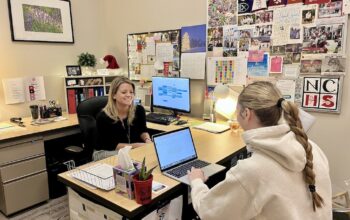Lauren Doherty, Editor-in-Chief
@ldohertycourant
Student journalists inherit a unique responsibility when they acquire positions on school publications. They agree to uphold values like truthfulness, objectivity, and fairness, and work to tell the stories of their respective school communities. But who, in turn, has the responsibility to tell the stories of the student journalists?
This question prompted me to create the Behind the Cover Podcast, a four episode YouTube series that talked via Zoom with the editors of Fairfield County student newspapers. I uncovered a network of extremely bright and well-spoken students, bonded by their passion for journalism. Woven throughout their experiences were themes of gratitude and leadership, but also limits and restrictions placed upon their voices.
Underlying student journalists’ initial interest in this field was an embracement of curiosity. “I’ve always just been a very curious person,” said Sydney Floch, an editor of Greenwich High School’s The Beak. “[The Beak] turned out to be an amazing way to channel all these questions into writing.”
Lora Simkova, the Editor-in-Chief of the Wilton High School’s The Forum, founded the publication after moving to Wilton at the start of her junior year. “[Journalism] is this bridge between an educational and sort of artistic-creative style that creates this really powerful source of writing,” Lora said.
With the students’ initial interest in journalism, a greater, much more serious responsibility was born: the responsibility of balancing writing truthful, meaningful news, while also respecting the school’s parameters.
Charlotte Ward, the Editor-in-Chief of Darien High School’s Neirad, published a piece last year reviewing an African-American musician’s work. She did not enjoy the music and thus wrote a music review according to such feelings. What was meant to be an innocent review, however, soon shifted into a Black Lives Matter argument. “It was a bit of a rude awakening because I realized how many ways journalism can be taken; your perspective is different from anyone else’s,” Charlotte said.
“I think sometimes it’s easier to talk about controversial topics that are widely recognized than controversial topics internal to the school,” Charlotte said.
Neya Kidambi, the Editor-in-Chief of Trumbull High School’s The Eagle’s Eye, cited a similar experience from last year when a student scaled a flagpole to fly an LGBTQ+ flag. This prompted a vetting process for which flags could be flown. “I think that’s something that would have made a really interesting article, but we weren’t allowed to write about it,” Neya said. “I think even though it does intersect with the concept of school news, it really comes down to our students being able to fully express themselves.”
Neya also experienced a degree of her school’s administrative censorship during her freshman year. She proposed an article intended to expose animal abuse at SeaWorld and a local aquarium, which was then not approved by the school principal to be published. “For me it’s all about truth and so I think in terms of writing the newspaper and even representing people, you want those voices to be able to be heard,” Neya said. “I think writing about controversial topics is important and necessary for representation… but sometimes it does conflict with what the school wants.”
“When it comes down to our principal, it’s about maintaining the image of the school,” Neya said.
Student journalists often feel an imperative responsibility to both their school community and themselves as writers. “As student journalists we have this expectation that we’re supposed to uphold the integrity of the school and make sure that what we’re saying is truthful,” Lora said. “But at the same time we have to portray our own opinion.”
Aniket Martins, the Opinions Editor for Fairfield Ludlowe High School’s The Prospect, claims that clear limits are established to the students in order to maintain a veneer of respect. “People have been quite good at expressing their opinions coherently,” Aniket said. “At times, I’ve had to change around the language slightly so that it comes off as a little less brazen and more thought through, but in general our staff writers are excellent at expressing their opinions well across all topics.”
The respective impact of student journalists’ writing is oftentimes what gives them the motivation and inspiration to continue their work. Harper Treschuck, the Editor-in-Chief of Fairfield Ludlowe High School’s The Prospect, had such a feeling after writing a piece focusing on mental health. “I was able to amplify what students were saying and what they were feeling. The article ended up being viewed by a lot of faculty members,” Harper said. “I was pleased that the article brought the issue to the attention of the faculty to promote more of this dialogue and conversation about such an important issue.”
I concluded all my podcasts by proposing a question that, as an aspiring journalism college major, had long haunted my mind: is the art of journalism truly dying? The resounding and hopeful answer from each student was “no”.
“We’re so vocal about our work and we’re so adamant about getting our opinions out, I really couldn’t see journalism dying anywhere in the near future,” Alicia Tang, an editor of the Greenwich High School’s The Beak, said. “We just need to learn how to pivot and adjust ourselves so we can address new demographics and old demographics equally in the same way.”
“The need for honest and factual reporting is something that is not dying at all. It’s increasing a lot, especially as we see the spread of misinformation online because social media is a double-edged sword,” Aniket said. “There’s always going to be a need for people to communicate journalism most effectively.”
Harper may have summarized the transition of modern journalism best. “The need for honest and factual reporting will not go away, just how we interact with journalism and how we define journalism may change.”
The role of student journalists is clear, representing their school communities and opinions while still respecting the limits of school parameters. But, the future of journalism, especially as it shifts into the hands of these student journalists, is even clearer.
Click this link to watch the four episode podcast series on the NCHS Courant Youtube channel.




